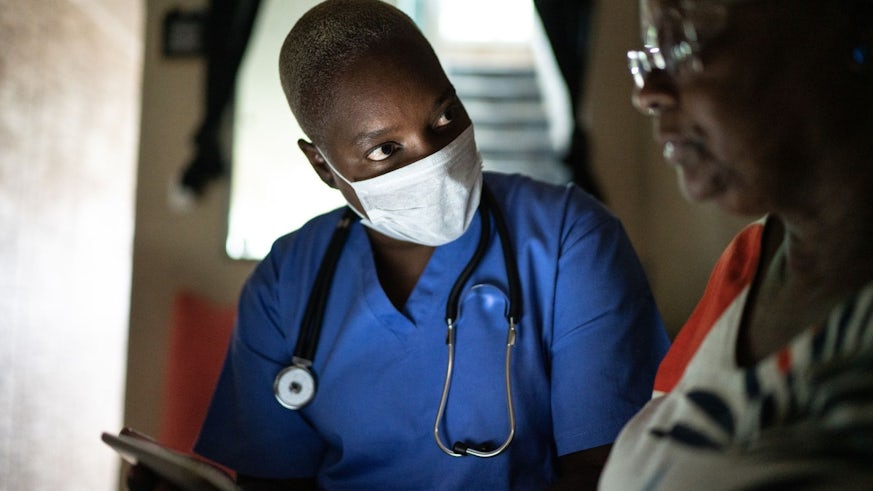Socioeconomic impacts of COVID-19 on BAME communities
10 September 2020

Reflections and recommendations from a Welsh Government report on the social and economic impacts of COVID-19 on Black, Asian and Minority Ethnic (BAME) communities was the focus of the latest session in Cardiff Business School’s Breakfast Briefing Series.
Emmanuel Ogbonna, Professor of Management and Organisation at Cardiff Business School and author of the report, got proceedings underway by reflecting on the damage wrought by the coronavirus (COVID-19) pandemic.
“But at the same time,” he said. “The pandemic has also enabled serious analysis and discussion on issues affecting equality, diversity and inclusion, perhaps more than ever before.”
In early May of this year, the First Minister asked Professor Ogbonna and members of the BAME COVID-19 Socioeconomic Subgroup to investigate disproportionate effects of COVID-19 on BAME communities in Wales.
BAME lived experience
Before sharing the findings of the cumulatively produced report, Professor Ogbonna outlined some caveats relating to terminology and experiential characteristics of COVID-19.
He addressed the term BAME, acknowledging that, for some, the term is problematic. However, the group’s rationale for using it was that it goes some way in attempting to represent multiple groups of people and, as a result, debunks the idea of these communities as a homogeneous whole.
Professor Ogbonna also added that while characteristics such as poverty and class might be determining factors in an individual’s experience of the coronavirus (COVID-19) pandemic, the focus of the report was specifically aligned to BAME lived experience.
Turning to the way in which these differences were brought into the public consciousness, Professor Ogbonna explained how the media reported that the disproportionate affects of COVID-19 were down to the actions and behaviours of the BAME community.
Referencing a study in The Lancet, which looked at pre-existing conditions like diabetes, dementia and others, Professor Ogbonna assured attendees that the evidence did not corroborate the assertions made in these kinds of media reports.
He said: “However, it was clear there was something somewhere that was causing higher death rates but which we couldn’t necessarily explain just by looking at ethnicity alone.
“And so, it was actually appropriate for us to undertake this study and very positive of the First Minister to have commissioned this report and take this issue seriously.”
Incomplete, inaccurate, and insufficient records
The quality of information public and private sector organisations have on their BAME employees was the focus of the next section of Professor Ogbonna’s presentation.
The first thing that struck the subgroup in their report investigations was the absence of quality information on ethnicity. The NHS and other healthcare organisations were among those with incomplete, inaccurate, and insufficient records as well as other public, private and third sector organisations.
“We simply don’t have enough,” remarked Professor Ogbonna.
“So, we didn’t actually know for sure who was dying or where they were dying. And this is significant because if you don’t have this information how do you know that your services are fair and that all members of your community are benefitting from what you are providing?”
As well as an absence of information relating to ethnicity, Professor Ogbonna also argued that the employment routes chosen by or viewed as accessible to many BAME community member often exposes them to the worst excesses of COVID-19. These include roles as locum doctors, nurses, bus and taxi drivers or other frontline workers.
Employment challenges such as these, taken together with other issues including youth affliction, financial pressures and domestic violence for example, Professor Ogbonna categorised these as generic experiences.
Before bringing the briefing to a close, Professor Ogbonna paid special attention to the report’s substantive findings which related directly to the members of BAME communities. These were drawn from discussions on:
- Living with racism in Wales
- Structural and systemic inequality.
Referencing NatCen British Social Attitudes survey, Professor Ogbonna explained how 26% of people in the UK self-identified as ‘very’ or a ‘little’ prejudiced, and further evidence from the European Social Survey which found that discriminatory perceptions of intelligence and work ethic towards BAME communities.

“The coronavirus pandemic is killing people not because they are BAME, but because of the racism and discrimination that people experience because of being BAME. It is the stress and anxiety that arise from racism that reduce immunity, expose us and increase our susceptibility to conditions like heart disease, to obesity and to all the factors that are linked to COVID-19.”
Before receiving questions from those attending, Professor Ogbonna concluded by outlining some of the 30+ recommendations included in the report.
Cardiff Business School's Breakfast Briefing Series is a network of events which enables business contacts to find out more about the latest research and key developments from industrial partners.
Following lockdown measures, implemented by Welsh Government in response to the COVID-19 pandemic, the School’s Executive Education Team has moved the series online.
If you were unable to attend, watch this recording of the event.
Share this story
Enabling our business contacts to find out more about latest business research and key developments from industry partners and practitioners.



